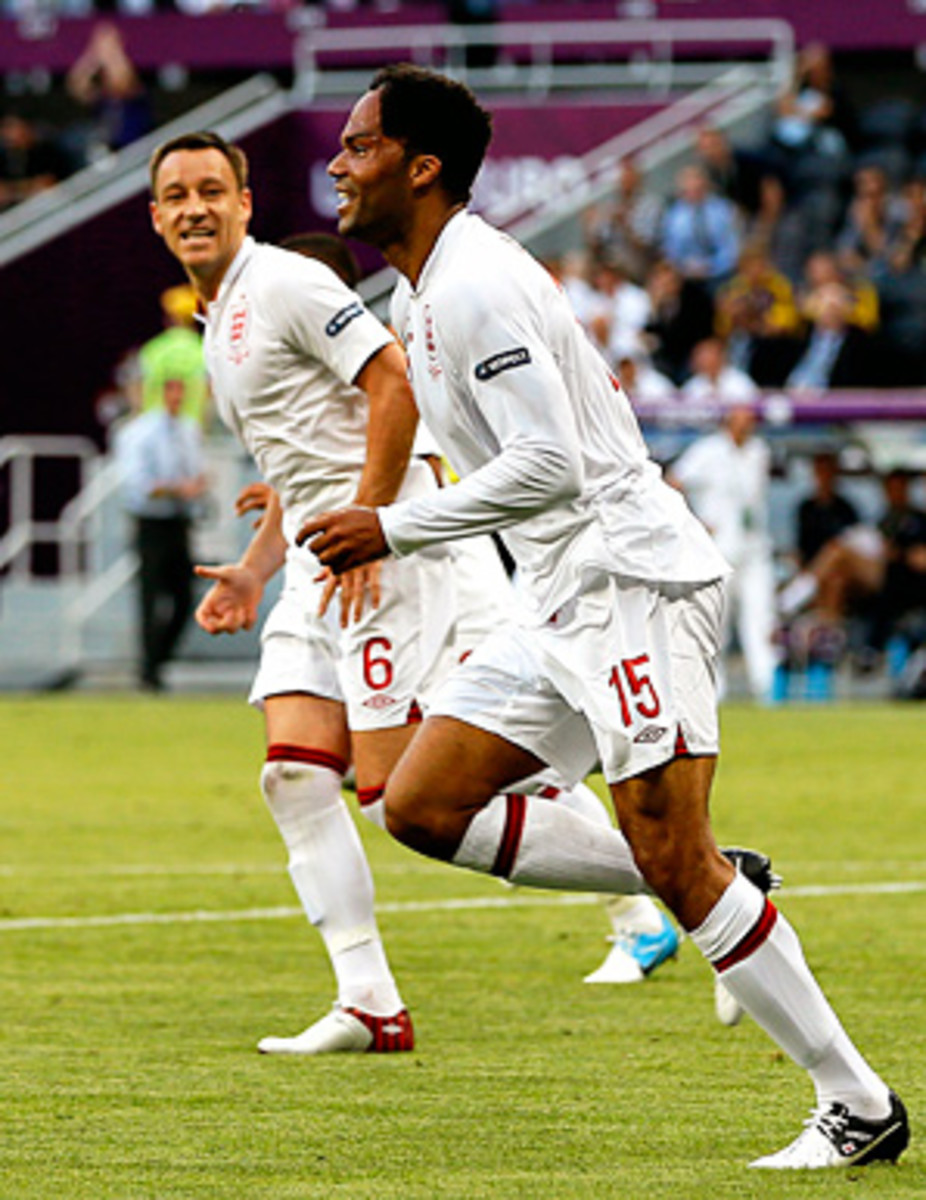Three thoughts: England's set play success forces draw with France
Three thoughts after the 1-1 draw between England and France in Donetsk, Ukraine.
1. England thrives with English goals. In the Balkans and perhaps elsewhere, a goal scored with a powerful header is known as an English goal. If that header comes from a set play, that makes it even more English (British, really, but in the Balkans comprehension of the distinction is blurry). So far in this tournament, that stereotype has proven to be true. Only two goals have been scored with one touch from a set play, and, appropriately, both were scored by players on English clubs: Sean St Ledger of Leicester City for Ireland and Joleon Lescott of Manchester City for England.
Both goals featured fine looping free-kick deliveries and were finished with powerful headers from central defenders. On both occasions, the defender -- Vedran Corluka for Croatia and Alou Diarra for France -- was overmatched by the greater strength and anticipation of the goal scorer. Set plays are a strength of the British game (and Ireland, in a football sense, plays a British game given that the bulk of its players compete for British clubs), and while it's problematic if they're the only goal-scoring options, they're effective nonetheless. England shouldn't harbor any embarrassment about trying to take advantage of a clear asset, no matter how unsophisticated it may seem.
2. There is a clear divide between proactive and reactive football. Like many sports, football styles have a spectrum, with teams' approaches ranging from proactive to reactive. The majority of sides at a European Championship typically hover somewhere around the middle, but in this tournament, there seems a clear divide between those that seek to dominate possession and those happy to absorb the pressure and strike on the break. Poland against Greece (in the first half), Spain against Italy, Germany against Portugal, Croatia against Ireland and France against England have all followed the paradigm of one team dominating the ball and the other resisting, the latter looking to score on counter attacks and set plays.
England, chaotic in its buildup to the tournament with the suspension of Wayne Rooney, was content to try to keep the game tight, and did so relatively well despite its sloppiness with possession. France was wasteful and Italian referee Nicola Rizzoli was appalling, resulting in the messiest game of the tournament so far. That suited England and the rigor of its shape. The means may not have been exciting, but the ends --- a point against the best side in the group -- more than justified them.
3. Fans are both neglected and patronized. The attitude of the football authorities toward fans is baffling. On one hand, they treat them like heroic adventurers, almost like great explorers of the early modern age, able to find vast resources and travel to alien environments. Upon arriving, however, they're expected to negotiate baffling train and bus networks and find places to sleep in overcrowded towns. For the first time since the mid-'90s boom, that resulted in England fans failing to use their full allocation of tickets. There were swathes of empty seats at Donbass Arena -- something that would have seemed unthinkable just five years ago.
Admittedly, the economic climate has hurt budgets, and fans' disposable incomes may have been used for London Olympics tickets rather than for cross-Europe treks to watch an England side that had the lowest expectations in 30 years. But still, England fans went to Japan. They went to South Africa. They travel in vast numbers to watch cricket and rugby in India, Australia, Sri Lanka and New Zealand. If they're not going to Ukraine, only a little more than three hours away, there's a problem. Namely: For all of the delights of Ukraine's football stadiums, the tournament never should have been hosted there, particularly given the expense and logistical difficulties of the country. Once again, fans are forced to pay the price for the misguided policy of football's administration.
There has been disorganization all over the place. The England fans' band has been a constant at matches for 18 years. Many find it irritating and would prefer that it wasn't present, but what happened in Donetsk is a disgrace: The band had permission from UEFA to enter the stadium, but Ukrainian security confiscated their instruments. It's not clear yet whether they will even be returned or not.
It's also not possible to take a Polish hire car across the border into Ukraine, making it nearly impossible for foreigners to travel from Warsaw to games in Lviv. The train takes a minimum of 11 hours because of the need to change the gauge of the wheels at the border, and essentially, the only way to attend the matches is to fly to Kiev and out again, something both time consuming and costly. This is almost certainly the most irrational football tournament ever staged in Europe.
Worse yet, once fans get into the stadium, they're treated like children with attention deficit disorders (and sponsor-appropriate credit cards). Throbbing music makes conversation impossible. Embarrassing cheerleaders attempt to whip the crowd into a frenzy with some terrible version of how they think fans act or talk. (Does any England fan really need a Ukrainian with a microphone shouting "1966" at them?) Then there's the most egregious innovation for this tournament: a countdown to kickoff.
Put simply, it's embarrassing. It's not New Year's Eve -- it's a football match that, for 149 years, has happily been started by the elegant simplicity of a referee's whistle. The authorities should have put the effort and money into making the hour before kickoff eye-wateringly annoying into thinking about basic logistics instead.






